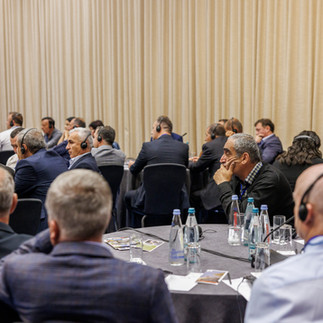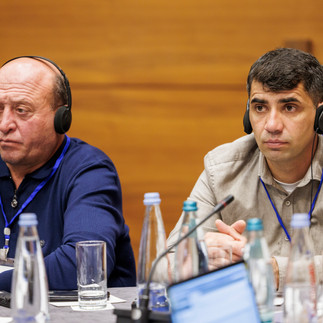NEWS | An Overview of ECF's Annual Gathering of the Regional Consultative Forum 2024
- Carmen Kuntz
- Oct 14, 2024
- 6 min read
The forum touched on the impacts of climate change but focused on how biodiversity conservation can contribute to the mitigation and adaptation of climate change.

Each fall, the Eco-Corridors Fund for the Caucasus (ECF) holds their annual meeting of the Regional Consultative Forum. This gathering provides a chance for those involved in the ECF programme to present the progress of the previous year, to network and connect in-person, and to share ideas and objectives for the future of the project. On Wednesday October 9, 2024, the ECF team welcomed government and stakeholder representatives, local administration and the leaders of community-based organisations to the Radisson Blu Iveria Hotel in Tbilisi for a day of presentations and information sharing. A total of 70 people gathered for the full-day event.
The ECF is now well into the second phase of the project, which started in February 2022. New Conservation Agreements (CA) are in various stages of being prepared and signed. The expansion and continuation of existing CAs are just some of the exciting developments of the project. The forum provided a chance for those on the ground and those behind the scenes to share information and progress. The primary theme of the forum this year was climate change, looking at the role that biodiversity plays in mitigation of global heating and the adaptation to the already inevitable effects of the changing climate.
Thanks to a very skilled team of translators, the session was conducted in all four languages the programme operates in – Armenian, Azeri, English and Georgian – and translated in real-time via headphones.
Opening Statements
The forum was officially opened with opening statements by country delegates from Georgia, Armenia and Azerbaijan. Karlo Amirgulashvili, the Head of the Biodiversity Department Ministry of Environment and Agriculture of the hosting country of Georgia started. He warmly welcomed the participants from all countries and regions and emphasized the importance of the conservation goals that the ECF project is focused on. This was followed by the statement by Hakob Matevosyan, from the Department of Nature Protected Areas and Biodiversity Policy within the Armenian Ministry of Environment, pointing out the importance of the innovative ECF approach linking conservation and socio economic development. Then Loghman Aliyev, Deputy of the department for analysis and forecasting of socio-economic development of the Azerbaijan's Guba Rayon Executive Authority, spoke about the positive experience with ECF in their region and the readiness to provide the necessary support in the future.
The forum then welcomed a representative from the German side of ECF cooperation, Anna-Maria Schneider from the German Embassy, who is the Head of Development Cooperation in South Caucasus. She spoke of the longevity of the ECF project, and the importance community involvement plays in this permanence of such projects. Next, Ursula Läubli, the Deputy Head of Mission of the Swiss Foreign Department within the Swiss Agency for Development spoke, extending gratitude to those who work hard to protect nature in the Caucasus. This was followed by a brief statement from the Managing Director of the Slovenian Center for International Cooperation and Development, Dejan Prešiček, representing the Slovenian side of ECF support, who spoke specifically about the ongoing development of safe forestry practices in Georgia specifically.
A longer welcome speech was provided by the Director of WWF Caucasus, Giorgi Sanadiradze, who touched on the ongoing progression of the project as it passes the midway point of phase two. Jernej Stritih, the Chief Technical Advisor then took the podium, providing a brief outline of the progress the ECF has made in 2023 and 2024.
“In all three countries we now realized we have to invest into revenue generating activities for the CBOs so they can sustain themselves in the future and can continue the nature conservation activities (beyond the end of the ECF programme). There will be a challenge - or an opportunity - to legally accept and continue these conservation agreements, which could be through payment or through land use rights, that is, if governments said ‘you can use this land if you continue to conserve the biodiversity on this land’. There are many opportunities for the future.” - Jernej Stritih, ECF Chief Technical Advisor
Integrating Biodiversity Conservation and Combating Climate Change in the South Caucasus
Following a short refreshment break, participants sat down for a session on Integrating biodiversity conservation and combating climate change in the South Caucasus. Well-known to the ECF project, Maka Bitsadze, Regional Conservation Manager for WWF Caucasus took the floor, discussing how to leverage the Ecoregional Conservation Plan (ECP) for the Caucasus for climate change mitigation and adaptation. Her speech was aptly titled, Two Crises, One Solution. Jernej Stritih then took participants through a comprehensive overview of the contribution of ECP, and specifically ECF, to climate change mitigation and adaptation in conservation landscapes of the South Caucasus. Calculations are being done to quantify the contribution of conservation efforts to carbon sequestration in the intervention areas of WWF and German Development Cooperation. At the same time the effects on climate adaptation are being assessed. This was followed by the International Consultant Heiner von Luepke, who broke down the complex topic of nationally determined contributions and ECP, the biodiversity-climate policy nexus.
"Climate change is one of the main drivers of biodiversity loss, but at the same time functioning ecosystems are essential for climate mitigation and adaptation. The two crises - global heating and biodiversity loss - have common causes in unsustainable production and consumption such as in agriculture and food, and in energy production. They must be tackled in an integrated way"
- Heiner von Luepke, Thünen Institute for Forestry
Local Experiences with Climate Change The next segment of the forum which followed the lunch break provided a more on-the-ground insight into the effects of climate change, from the perspective of the locals involved in the ECF. Anush Sargsyan, from the Armenia's Qoshaqar CBO discussed the impacts climate change has on the landscape and biodiversity in Armenia, focusing on recent extreme weather events. Then, Azerchin Muradov from the CBO called Azad Ve Zangin Tabiat in Azerbaijan spoke about the challenges of climate change and their impact on wild animals and ecosystems in Azerbaijan. And Mikheil Chkhitunidze from the Bolajuri CBO in Georgia discussed the impacts of a changing climate in their region of Georgia as well as the local actions that are being taken to adapt.
And closing this segment of the forum, Naire Yeritsyan from WWF’s Living Landscapes for Market Development in Armenia (LILA) project spoke, discussing the multiple measures the LILA project is utilizing to address climate change within the framework of the project including energy efficiency and renewable energy production using photovoltaics.
Living Landscapes After a brief pause for refreshment and networking, the forum resumed with two presentations on the theme of “Living Landscapes” providing more detail on how foreign partners of the ECF are injecting knowledge and skills that are applicable for locals and strategically directed to support the longevity of the ECF programme. Alla Ghazaryan, the Project Coordinator for the Strategic Development Agency, an Armenia NGO, presented private sector development initiatives with the corridors the ECF is operating, as a part of the LILA. Then, Matjaž Harmel, the Team Leader for the Slovenian consultancy Zavita spoke, providing details on the exchange of experience between Slovenia and Georgia during the two phases of the project Sustainable Forest Management in Adigeni.
And finally, the three ECF National Coordinators took turns providing the main thematic achievements of ECF in the countries this year. Armen Shahbazyan, the ECF National Coordinator for Armenia, Khayyam Ismayil the National Coordinator for Azerbaijan and Irakli Gogoladze the National Coordinator for Georgia all spoke in order. They discussed the status of the project in each country, all focusing on the new and soon-to-be-signed Conservation Agreements. All three presentations placed an emphasis on the involvement and motivation of the locals involved in the ECF.
Closing Remarks
Closing remarks were provided by Jernej in summary of the forum but also of the year for the ECF.
“After today it has become very evident that there have been quite a lot of activities on the ground this year; we see a lot of partners here who we have been working with us – from different sides, from different levels; government officials, local experts, partners, locals from the CBOs and regions. On one hand we are working locally with very local issues, but we now know we can also have an impact on global topics like climate change. We will present the good examples of practises in Baku (at COP 29), of how to combine biodiversity and climate change mitigation at the local level with international support. We have quite a lot of work to do, but looking around, I am sure we will be successful.” - Jernej Stritih, ECF Chief Technical Advisor
This annual event continues to be a key platform for sharing ideas and strengthening collaboration to advance biodiversity conservation and strengthen community-based nature conservation in the Caucasus. The ECF team was proud to welcome such a committed and diverse group driving positive change.


















































































































